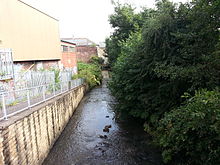River Spen
| River Spen | |
|---|---|

Spen River running east through Millbridge, Liversedge into Heckmondwike
|
|
| Country | England |
| Basin features | |
| Main source | Confluence of Hunsworth Beck and Nann Hall Beck in Cleckheaton 81 metres (266 ft) 53°43′59″N 1°43′05″W / 53.73306°N 1.71806°W |
| River mouth |
River Calder at Dewsbury 42 metres (138 ft) 53°40′49″N 1°39′4″W / 53.68028°N 1.65111°WCoordinates: 53°40′49″N 1°39′4″W / 53.68028°N 1.65111°W |
| Basin size | 46.3 square kilometres (17.9 sq mi) |
| Physical characteristics | |
| Length | 8 kilometres (5.0 mi) |
The River Spen, known colloquially as Spen Beck, is a river in the county of West Yorkshire, England and is a tributary of the River Calder. It rises north of Cleckheaton, runs through Liversedge and flows into the River Calder, West Yorkshire south of Dewsbury at Ravensthorpe. The average rainfall for the river valley is between 600-1000mm per annum. Combined with the steep narrow river channel, this makes the Spen susceptible to regular flooding.
The river becomes the Spen at the confluence of Hunsworth Beck and Nann Hall Beck in Cleckheaton. It flows south past local Industrial premises parallel to a dismantled railway line before turning south east on the outskirts of Liversedge. It continues flowing in this direction through the heart of the Industrial centre of the town before returning southwards along the edge of Heckmondwike. On the outskirts of the village of Ravensthorpe it turns south east again before joining the River Calder.
The river is mainly an urban waterway and has suffered from sewage effluent and industrial waste, though levels of pollutants and mine water discharges have decreased since 1999. Heavy rain can cause pollutant levels to rise and the river suffers from tipping and urban litter.
There are several non-native species of plant found along the river including Giant Hogweed, Himalayan Balsam and Japanese knotweed. Bistort, wild garlic, nettles and dandelions are found in abundance in the meadows between the conurbations.
...
Wikipedia
